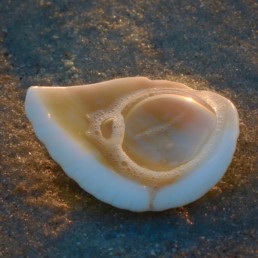Hard news and heartache wash up on the tide line of my day like shell fragments and driftwood heaved ashore in the pounding surf. There must have been a storm at sea; so many broken bits have collected at my feet. This time my own little boat has been sheltered in calmer waters, but people I love are patching holes and surveying damage. My bare feet struggle on the uneven terrain of the beach, amongst the shards and splinters of weathered bodies, broken hearts, and shattered expectations. Loved ones are facing illness, decline, and loss in themselves or beloved others, and the news of the world, arriving like the tide from every corner of a suffering planet, erodes the stalwart boulders of hope and belief.
There must have been a storm at sea; so many broken bits have collected at my feet.
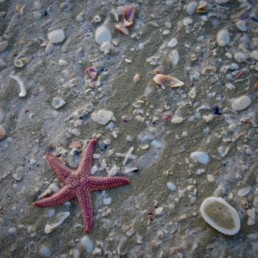
What is a trained fixer to do with parts that remain, fragments that no longer fit, lives that have been rendered unrecognizable? When Grief arrives unannounced to the doctor’s office or the friend’s back porch, she strips a fixer of all her tools; nothing remains but naked presence. The decades spent learning to cure what can be cured and to remove that which cannot, crumble like sandcastles. We share a beach that is smoothed by the same rhythmic heaving and undertow that washes some bits ashore and reclaims others to itself.
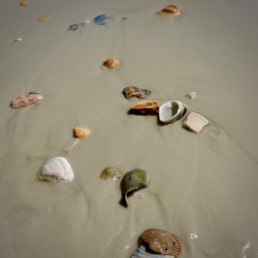
We share a beach that is smoothed by the same rhythmic heaving and undertow that washes some bits ashore and reclaims others to itself.
Someone asked me once how doctors deal with death, how we reconcile ourselves to the one sure statistic in our work: a 100% death rate. Mary Oliver states it more poetically, “Doesn’t everything die at last, and too soon?” We understand statistics, of course, and build careers around them. Even with this knowledge of death, this certainty of loss, suffering still feels like failure, niggling at our conscience and ego like a persistent child. But death is only a piece of our experience of loss as professionals and human beings. Smaller deaths chip away at our perceived impermeability – the loss of function or ability; letting go of someone beloved; a change in the wind that blows us completely off course.
"Doesn't everything die at last, and too soon?"
- Mary Oliver
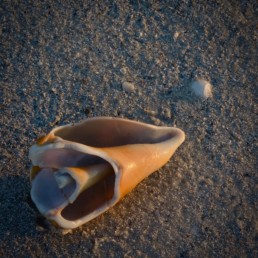
These thoughts toss and tumble like weathered sea glass as I collect broken bits of treasure on the beach. Like the other souls meandering along this stretch of shore, if I am honest I will admit I am always watching for something whole and beautiful to have been lifted up from the sea and set down gently at my feet. An intact lightning whelk, conch, or cockle shines in the morning sun like so much buried treasure. It has taken the passing of years, the reckoning with my own losses and flailing, to notice and treasure the imperfect pieces that have endured the pounding surf to be recklessly and casually flung ashore. A nearly translucent moon shell, its pearly outer layer cracked in half, reveals a swirling center that deepens into itself. The core of a broken whelk remains strong and intact, as tightly coiled and lovely as a rosebud. Scallops and quahogs concede only a tiny, perfect hole at the top, the work of a carnivorous snail that wrought the demise of the creature within.
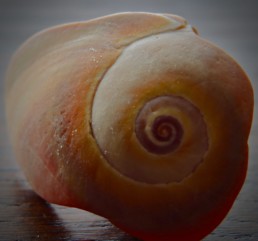
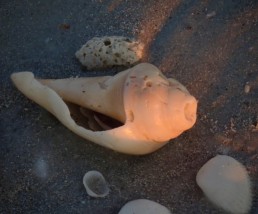
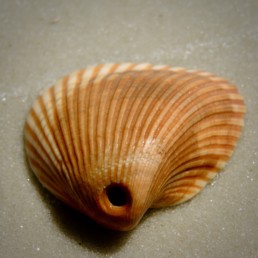
When I truly begin to see these broken bits, my focus sharpens as my consciousness widens. I notice shark’s teeth and fish vertebrae, skeletal shards of coral and glistening individual grains of sand. I used to search only the horizon and the wide arc of sky for a glimpse of divine inspiration. In gazing outward I missed the broken, granular beauty at my feet.
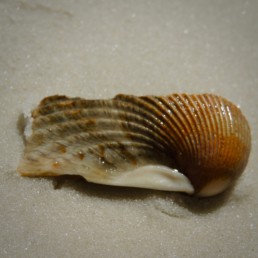
In gazing outward I missed the broken, granular beauty at my feet.
Finding beauty in brokenness can feel like a trespass or a betrayal, the life-siphoning probe of the carnivorous snail. The beauty found in loss does not come from artificial glory in suffering, or inauthentic solace in the misfortune of “the other.” I need to show my own cracks and imperfections to participate authentically in this cockamamie treasure hunt. Some days it is my own naked, curving core that is splayed open and washed up on the beach. I am mindful of this as I witness and honor the broken edges and enduring center in others. We share the experience of the push and pull of tides, of wind and waves, of storms at sea; providing witness and comfort one day, and allowing others to do the same for us on another. If we have glimpsed the solid core of ourselves when all else has been chipped away, if we have borne authentic witness to another being, if we have been vulnerable enough to let someone else touch our own ragged, weathered shell – then we have been blessed in our brokenness. The beautiful whole is revealed in its fragile fragments.
The beautiful whole is revealed in its fragile fragments.
